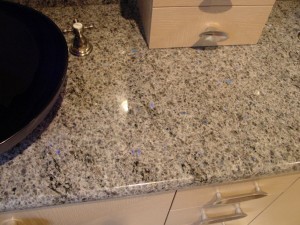GRANITE
Granite Cleaning
Granite is an igneous stone and must be treated in a different way than marble, even though the appearance is the same in many respects.

Polished Granite
A very high degree of skill is required in working with granite, particularly polished granite. This is due to the fact that granite will not achieve a polish by way of buffing compounds alone, but must be painstakingly diamond honed through a series of steps to mechanically achieve the polish.
So, where marble can at times be honed with 3-4 diamond polishing steps, then polished with a buffing compound, granite must receive 6-8 steps, and much more care and time taken with each step. With the darker colored granites, multiply the difficulty factor by ten.
There are many granites which were deemed unsuitable for architectural use ten years ago, but now, due to demand, are being widely used. The problem with these granites is that they did not have the colour, ability to hold a polish, or density (could stain). So to make these materials “market ready” the quarries will now “doctor” these stones with dyed resins, to enhance the colour and the ability to hold a shine. Dyes are polyester based, therefore will fade under UV exposure. It can be removed if they come in contact with strong solvents. “Satins” can appear which are really not stains at all. Rather “reverse stains” where the colour stained granite was stripped in an area and left with what appears to be an etch.
Granite Cleaning (flamed)
Another very popular finish for granite is called “flamed” where the natural texture of the granite is re-created. This finish is very popular in external applications due to slip resistance. However it is porous and will require a high quality impregnating sealer, suitable for granite.
The granite cleaning process for flamed textures is similar to sandstone and quartzite, which requires special equipment to remove embedded soils, and thoroughly rinse. Cleaning chemicals are based on the soiling that need to be dissolved (mineral, biological, or oils).
An understanding of these issues is essential in prescribing a cure, or a possible work around. In most cases, granite is the ultimate surface for benchtops and floor tiles because of the extreme high level of durability. Our expertise with granite involves sealing (impregnating), scratch removal, repairs, seam work, and stain removal.
Granite Polishing
We also have a unique granite polishing method for countertops that we guarantee will increase shine by 20%, and a method to fill micro fissures, which can harbor bacteria. These methods can also be used on polished granite floors.
